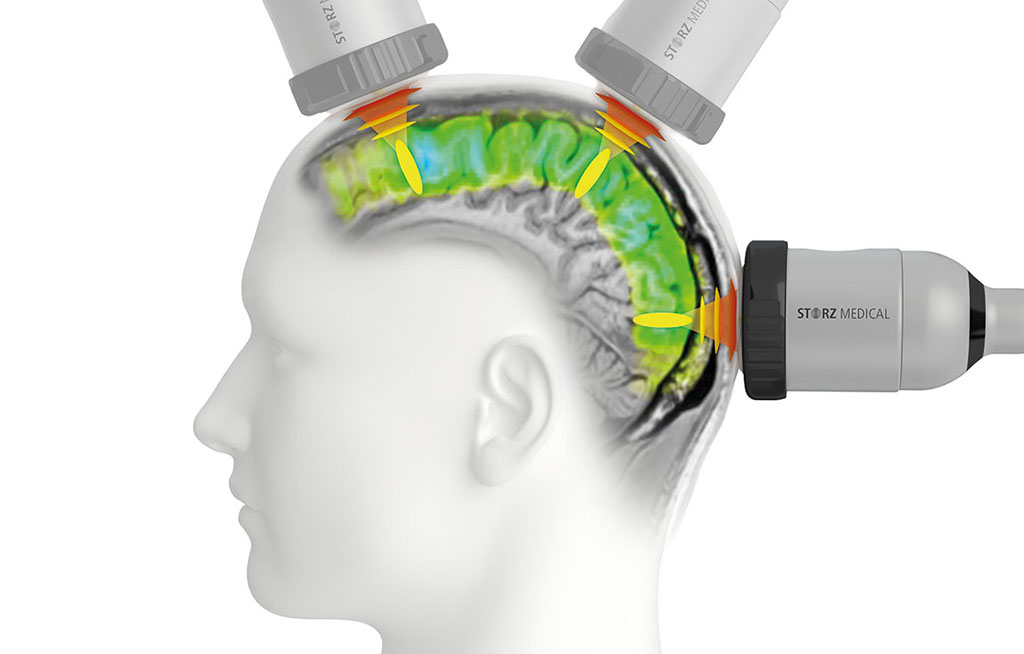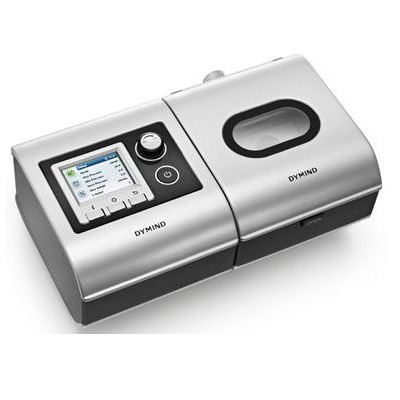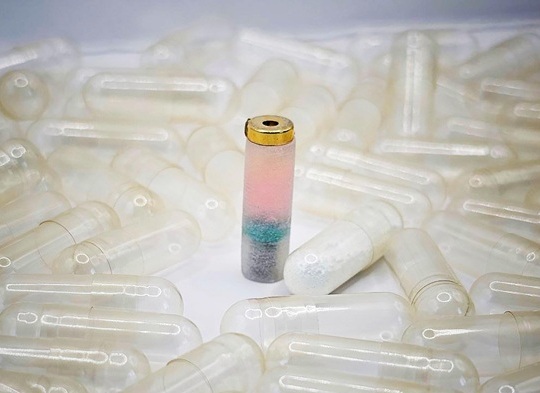Focal Ultrasound Regenerates Alzheimer's Patients’ Brains
|
By HospiMedica International staff writers Posted on 22 Jan 2020 |

Image: Clinical sonication can help reverse Alzheimer’s disease (Photo courtesy of Storz Medical)
A new navigated ultrasound focal brain therapy can activate neurons to help regenerate brain functions in Alzheimer's disease (AD), claims a new study.
Developed at the Medical University of Vienna (MedUni; Austria), Storz Medical (Tägerwilen, Switzerland), the Center for Movement Disorders (Bad Krozingen, Germany), transcranial pulse stimulation (TPS) is a clinical sonication technique based on ultrashort ultrasound pulses which markedly differ from existing focused ultrasound techniques, as the pulse emitted by the ultrasound device is 3-5 mm wide, and approximately three cm long. An accurate "map" is first of all made of the patient's brain using magnetic resonance imaging (MRI).
The TPS pulse causes short-term membrane changes in the brain cells, affecting the concentration of transmitters and other biochemical substances. This results in activation of brain neurons and the development of compensatory networks that improve brain function. In a clinical pilot study involving 35 patients with AD, neuropsychological scores improved significantly after TPS treatment, and the improvement lasted up to three months, correlating with an upregulation of the memory network, as evidenced by functional MRI (fMRI) data. The study was published on December 23, 2019, in Advanced Science.
“For the first time in the world, TPS enables us to penetrate into all areas of the brain by means of an ultrasound pulse delivered directly to the skull in a non-invasive, painless procedure, during which the patient is fully conscious, and to specifically target particular areas of the brain and stimulate them,” said lead author Roland Beisteiner, MD, of MEdUni. “It is like starting up an old engine again. Those neurons that are still activatable show marked improvements after the procedure. The decline in performance is slowed down.”
TPS was delivered using the Storz Neurolith system using an ergonomic handpiece that minimizes hand fatigue, facilitating treatment when working directly on the patient. A coupling surface adapts to any shape of head, making the treatment with focused pulses simple and efficient. Biological effects of TPS include increased cell permeability, stimulation of mechanosensitive ion channels, release of nitric oxide (which leads to vasodilation), increased metabolic activity, stimulation of vascular growth factors (VEGF 3 and 4).
Related Links:
Medical University of Vienna
Storz Medical
Center for Movement Disorders
Developed at the Medical University of Vienna (MedUni; Austria), Storz Medical (Tägerwilen, Switzerland), the Center for Movement Disorders (Bad Krozingen, Germany), transcranial pulse stimulation (TPS) is a clinical sonication technique based on ultrashort ultrasound pulses which markedly differ from existing focused ultrasound techniques, as the pulse emitted by the ultrasound device is 3-5 mm wide, and approximately three cm long. An accurate "map" is first of all made of the patient's brain using magnetic resonance imaging (MRI).
The TPS pulse causes short-term membrane changes in the brain cells, affecting the concentration of transmitters and other biochemical substances. This results in activation of brain neurons and the development of compensatory networks that improve brain function. In a clinical pilot study involving 35 patients with AD, neuropsychological scores improved significantly after TPS treatment, and the improvement lasted up to three months, correlating with an upregulation of the memory network, as evidenced by functional MRI (fMRI) data. The study was published on December 23, 2019, in Advanced Science.
“For the first time in the world, TPS enables us to penetrate into all areas of the brain by means of an ultrasound pulse delivered directly to the skull in a non-invasive, painless procedure, during which the patient is fully conscious, and to specifically target particular areas of the brain and stimulate them,” said lead author Roland Beisteiner, MD, of MEdUni. “It is like starting up an old engine again. Those neurons that are still activatable show marked improvements after the procedure. The decline in performance is slowed down.”
TPS was delivered using the Storz Neurolith system using an ergonomic handpiece that minimizes hand fatigue, facilitating treatment when working directly on the patient. A coupling surface adapts to any shape of head, making the treatment with focused pulses simple and efficient. Biological effects of TPS include increased cell permeability, stimulation of mechanosensitive ion channels, release of nitric oxide (which leads to vasodilation), increased metabolic activity, stimulation of vascular growth factors (VEGF 3 and 4).
Related Links:
Medical University of Vienna
Storz Medical
Center for Movement Disorders
Latest Ultrasound News
Channels
Critical Care
view channel
AI Heart Attack Risk Assessment Tool Outperforms Existing Methods
For decades, doctors have relied on standardized scoring systems to assess patients with the most common type of heart attack—non-ST-elevation acute coronary syndrome (NSTE-ACS). The GRACE score, used... Read more
'Universal' Kidney to Match Any Blood Type
Blood-type incompatibility has long been one of the greatest obstacles in organ transplantation, forcing thousands of patients—particularly those with type O blood—to wait years longer for compatible donors.... Read moreSurgical Techniques
view channel
Minimally Invasive Endoscopic Surgery Improves Severe Stroke Outcomes
Intracerebral hemorrhage, a type of stroke caused by bleeding deep within the brain, remains one of the most challenging neurological emergencies to treat. Accounting for about 15% of all strokes, it carries... Read more
Novel Glue Prevents Complications After Breast Cancer Surgery
Seroma and prolonged lymphorrhea are among the most common complications following axillary lymphadenectomy in breast cancer patients. These postoperative issues can delay recovery and postpone the start... Read morePatient Care
view channel
Revolutionary Automatic IV-Line Flushing Device to Enhance Infusion Care
More than 80% of in-hospital patients receive intravenous (IV) therapy. Every dose of IV medicine delivered in a small volume (<250 mL) infusion bag should be followed by subsequent flushing to ensure... Read more
VR Training Tool Combats Contamination of Portable Medical Equipment
Healthcare-associated infections (HAIs) impact one in every 31 patients, cause nearly 100,000 deaths each year, and cost USD 28.4 billion in direct medical expenses. Notably, up to 75% of these infections... Read more
Portable Biosensor Platform to Reduce Hospital-Acquired Infections
Approximately 4 million patients in the European Union acquire healthcare-associated infections (HAIs) or nosocomial infections each year, with around 37,000 deaths directly resulting from these infections,... Read moreFirst-Of-Its-Kind Portable Germicidal Light Technology Disinfects High-Touch Clinical Surfaces in Seconds
Reducing healthcare-acquired infections (HAIs) remains a pressing issue within global healthcare systems. In the United States alone, 1.7 million patients contract HAIs annually, leading to approximately... Read moreHealth IT
view channel
Printable Molecule-Selective Nanoparticles Enable Mass Production of Wearable Biosensors
The future of medicine is likely to focus on the personalization of healthcare—understanding exactly what an individual requires and delivering the appropriate combination of nutrients, metabolites, and... Read moreBusiness
view channel
Philips and Masimo Partner to Advance Patient Monitoring Measurement Technologies
Royal Philips (Amsterdam, Netherlands) and Masimo (Irvine, California, USA) have renewed their multi-year strategic collaboration, combining Philips’ expertise in patient monitoring with Masimo’s noninvasive... Read more
B. Braun Acquires Digital Microsurgery Company True Digital Surgery
The high-end microsurgery market in neurosurgery, spine, and ENT is undergoing a significant transformation. Traditional analog microscopes are giving way to digital exoscopes, which provide improved visualization,... Read more
CMEF 2025 to Promote Holistic and High-Quality Development of Medical and Health Industry
The 92nd China International Medical Equipment Fair (CMEF 2025) Autumn Exhibition is scheduled to be held from September 26 to 29 at the China Import and Export Fair Complex (Canton Fair Complex) in Guangzhou.... Read more
















